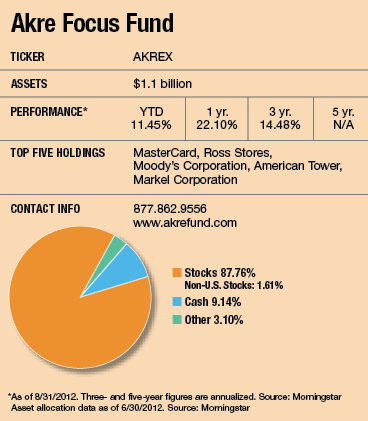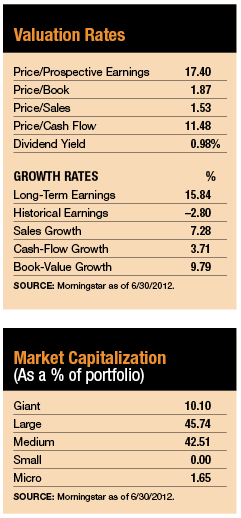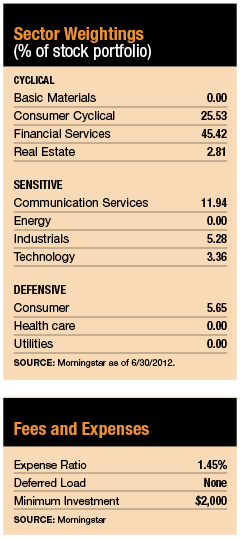If stock market volatility and low interest rates make being a financial advisor tough today, consider what it was like in the 1970s. At that time, as inflation took hold and economic growth stagnated-the toxic confluence of conditions that eventually came to be known as "stagflation"-hard assets such as real estate thrived as financial assets such as stocks and bonds took a beating.
Back then, Chuck Akre was a young stockbroker working for a regional brokerage firm in Washington, D.C. He remembers clients calling and asking if perhaps they might be better off pulling their money out of stocks and putting it in real estate, in artwork or even under the mattress-anywhere but financial assets. "Just about everything was losing value, and people weren't happy about it," says the 69-year-old founder and manager of the three-year-old Akre Focus Fund.
 But Akre found a way to play defense. The self-taught investor, who graduated from American University in 1968 with a degree in English literature, found that the stocks faring better were those of companies that could stay competitive by raising prices to keep pace with inflation. In a slow economic environment, he reasoned, those stocks could endure if they had a market leadership position, faced no competition or boasted some other sustainable advantage.
But Akre found a way to play defense. The self-taught investor, who graduated from American University in 1968 with a degree in English literature, found that the stocks faring better were those of companies that could stay competitive by raising prices to keep pace with inflation. In a slow economic environment, he reasoned, those stocks could endure if they had a market leadership position, faced no competition or boasted some other sustainable advantage.
The names of such companies have changed over the last 40 years, but the major theme running through the Akre Focus Fund's concentrated 25-stock portfolio is the same: The companies must enjoy an ongoing advantage allowing them to maintain pricing power amid slow economic growth. One holding, Apple, has been able to do this because of its dominant market niche. Others, such as Dollar Tree and Ross Stores, can lower the prices on their merchandise to draw cash-strapped consumers.
It will be critical to maintain pricing power over the next several years, Akre believes, and he says a familiar economic environment could well re-emerge as he approaches his 70s.
"We consider the possible outcomes for the fiscal crisis which exists in the U.S. today," he wrote in his second-quarter commentary to shareholders. "We believe a likely scenario is an experience not unlike the 1970s, which was termed "stagflation," and was characterized by low growth and rapidly rising interest and inflation rates." 
With Congress unwilling to cut spending, the national debt will continue to accumulate. "The government will keep printing money, which will devalue our currency. In all likelihood, inflation will rise at a significant rate. The last time anything like that happened was the 1970s."
At the same time, economic growth will remain constrained by consumers who have more limited access to credit and have reached the end of their spending rope. "The official unemployment rate is just over 8%, but including those who have given up looking for work or who are working fewer hours raises that figure to the midteens," he says. "In an economy that's driven by consumer demand, the ability to increase spending just isn't there."
In such an environment, he says, it's important to look for "compounding machines"-companies likely to produce strong long-term returns on equity. These must be reasonably priced; he will only buy them if they sell at no more than 15 times free cash flow.
Akre prefers that managers reinvest cash to help grow their businesses rather than distribute it to shareholders as dividends. Executive compensation must not make excessive use of stock options or other reward systems that dilute the financial interests of existing shareholders. And the companies must keep their debt at reasonable levels to avoid the ravages of possible rising interest rates.
As the fund's low turnover suggests, Akre is a faithful investor who typically holds on to his picks for several years. Because companies that fit his criteria don't pop up all that often, he rarely sells them just because their valuations are high, nor does he adhere to strict pricing targets. But he might pull the trigger if management stumbles badly or if the reasons he bought the stock in the first place are no longer relevant.
Reasonably priced, well-run companies armored for downturns are familiar territory to Akre, who ran the FBR Focus Fund between 1997 and August 2009. During that period, the fund produced an annualized return of 12.3%, while the Standard & Poor's 500 index came back with 4.4%.
He left FBR largely because the firm proposed cutting the fund's investment management fee. When he decided to launch Akre Focus, the analysts who worked with him on FBR Focus stayed behind to run that fund. Akre set about building a new team. 
His new fund got off to a slow start in 2009, in part because he took his time investing new inflows while the market was rising. But Akre Focus has steadily chugged past its competition since then. From its inception in August 2009 through June 30, its annualized return of 15.34% beat the S&P 500 index by more than two percentage points.
Word of mouth and some good publicity have helped Akre Focus gain more assets in three years, $1.1 billion, than his 15-year-old former charge, which has $750 million. Akre says the increasing size of the fund won't dampen his investment style, though he admits that it limits the size of positions he can take in smaller companies.
Investors can look to FBR Focus's long history to get an idea of what to expect at the newer Akre Focus. Much of the older fund's success came from losing less than its competitors in down markets, according to Morningstar analyst Russel Kinnel. Its relatively light presence in technology stocks softened the blow of the "tech wreck" in the early 2000s, he notes, though the fund sometimes lagged a bit during bullish periods.
Tech stock valuations have fallen to more reasonable levels since the newer fund emerged, and Akre has been able to pick up some at attractive prices. According to his latest fact sheet, technology companies such as Apple and Computer Services account for 19% of his assets. Financials and consumer discretionary, the two largest sectors, each account for about 30% of assets.

The fund invests in companies of any size, and it can own sizable stakes in just a few stocks. Its top 10 stocks recently accounted for almost 60% of assets.
From time to time, Akre loads up on cash if he can't find investment opportunities in the stock market, especially when money is coming into his fund at a rapid clip. Besides, he likes to have ample cash on hand so he can swoop in on buying opportunities when the market tumbles. At the end of March, for example, he stood at 26% cash in the fund because he had seen a combination of strong inflows and a lack of attractively priced stocks to absorb them. Much of that money was funneled into stocks during the market downturn in the spring and by the end of June, the war chest had shrunk to about 14%, where it stands now.
At 9.7% of net assets, MasterCard is the fund's largest holding. With its ability to capitalize on the growing number of international credit card transactions, the stock typifies the "compounding machine" Akre craves. He began buying the stock soon after the fund opened, and has added to the position periodically. At current levels, it sells at 16 times estimated 2013 cash flow per share, and Akre believes it can grow cash flow at a "high teens" rate over the next five years.
Another longtime holding, cell tower operator American Tower, maintains its pricing power through multiyear, non-cancellable contracts with wireless carriers that feature annual pricing escalators. The company is well ahead of its peers on the international front and has more than 40% of its towers located in countries with significant growth potential, such as India and Brazil. In the U.S., the company is enjoying growth because of the increasing demand for high-speed wireless data and thus the need for more network capacity.
O'Reilly Automotive, one of the fund's newer positions, is an auto parts retailer and distributor that sells to commercial garages and do-it-yourselfers. Like its two main competitors, AutoZone and Advanced Auto Parts, it stands to benefit from constrained consumers who must keep their cars longer and need parts to maintain them. But O'Reilly has an advantage over those companies because it dominates in independent garages. The company also carries very little debt, and it is enhancing shareholder value by buying back its shares.
Off-price retailer TJX Companies, another newer purchase, fits into the fund's focus on companies that cater to cash-strapped consumers. "The company's cash balance is significantly higher than its debt, and it's growing square footage and same-store sales," Akre says. "But its secret sauce is a terrific ability to execute the logistics of managing special purchases at the right price."